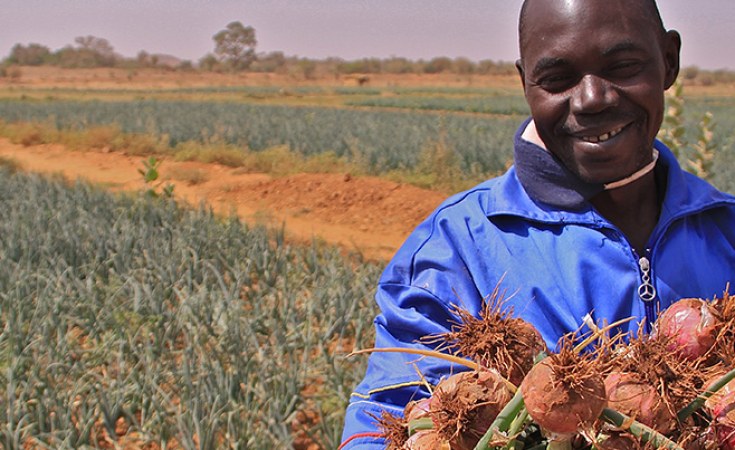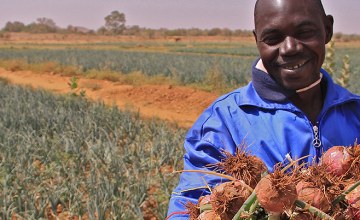On the occasion of the African Development Bank's commemoration of the Africa Year of Agriculture and Food Security, on Monday, September 29, 2014 in Abidjan, Chiji Ojukwu, Director of the AfDB's Agriculture and Agro Industry Department, reflects on the importance of agriculture in Africa.
What are the main food crops and cash crops that can help the continent address its food security and reduce poverty? What are the Bank's future concrete actions to sustain these on the ground?
The strategic priority crops designated by the AUC in Africa are maize, rice, cassava and wheat. These crops also constitute the basis of the Bank's US $60 million support to agricultural research at the International Institute of Tropical Agriculture (IITA), International Center for Agricultural Research in the Dry Areas (ICARDA), Africa Rice and International Food Policy Research Institute (IFPRI). However, as part of the Bank's new Agriculture Policy and Strategy [2015-2019], support for the development of agricultural value chains in these crops will also involve increased value addition along the supply chain. Future support for agricultural infrastructure will involve increased investments in irrigation, feeder roads and off-grid energy access in the rural areas. In addition, though not through support to research, the Bank also invests in livestock and fisheries infrastructure development, including aquaculture.
How can trade in agriculture between African countries be improved?
In an increasingly globalized environment, Africa's participation in the global agricultural market remains limited, at only 2%. Regional trade has so far played only a marginal role. Africa's highest trade volume in 2012 for food exports was from East Africa at a just 16%, compared with West Asia's at 45.3%.[1] Africa's current internal trade is low - making up only about 10% of its total trade. For the developing countries in Asia, intraregional trade as a share of total trade was roughly 17% in 2010; for the member countries of the European Union, the same figure was more than 60%.
Improving global agricultural trade will require changes to subsidy policies of rich countries, expanding market access and reversing supply constraints such as poor infrastructure, limited trade finance among others. The main factors that impinge on increasing intra-African trade levels include limited regional integration, weak economic diversification, persistent conflicts, infrastructure and cross border issues, and low level of value addition. Africa imports US $25 billion of food annually. Improved value addition and processing can improve internal supply and import substitution through domestic production and trade.
In spite of efforts by the Bank and African governments, there are still shortfalls in agriculture productivity. How do we reduce the huge deficit in financing agriculture in Africa?
Africa's farm yields are low and the agriculture sector in Africa is the least productive in the world, with an average productivity rate of 36%. Africa's current food import is in excess of US $25 billion per year. The continent currently imports more than 23,000 metric tons of cereals annually and its food trade deficit is projected to grow to more than 98,000 metric tons by 2050. Only 34% of rural Africans are living within two kilometres of an all-season road, compared to East Asia and the Pacific countries where 90% of the rural populations have such access[2]. According to the Africa Infrastructure Country Diagnostic (AICD), 39 million hectares of agricultural land in Africa is physically suitable for irrigation, yet the percentage of irrigated arable land is 7% (barely 3.7% in Sub-Saharan Africa)[3]. An annual increase in irrigation investment by African countries of 3.6% would triple the irrigated harvested area to 22 million hectares by 2050[4].
Between 1967-2013, the Bank has invested more than US $12 billion in the agriculture sector on the continent. With about 65% of Africa's population living in rural areas, Governments will need to invest more in rural infrastructure to ensure shared growth. Financing agriculture in the future will have to come from new and innovative ways. However, it must start with Governments honoring the Maputo Pledge to allocate at least 10% of national budgets to agriculture. Promoting anchor investments and out-grower schemes can bring the new technology and innovation required to close the food import gap. Radical land reforms can place millions of hectares under more equitable and secure tenancy arrangements and can attract substantial 'collaterized' investments into the sector. The Bank will work with the RMCs and our partners to substantially reduce the financing deficit.
What will be the form of the Bank's new agriculture strategy starting in 2015?
The Bank's New Agriculture and Agribusiness Policy and Strategy [2015-2019] seeks to promote agriculture value chains and bring the sector to the top of the African transformation agenda by establishing a renewed framework for the Bank's role. It focuses on three mutually reinforcing areas: (i) expanding agriculture infrastructure; (ii) promoting agribusiness and innovation; and, (iii) building resilience and promoting the sustainable management of natural resources. In addition, the strategy now views agriculture as a profitable business for Africa and prioritizes the development of smallholder farmers as they play a vital role in boosting growth, reducing poverty and ensuring food and nutritional security. The proposed new policy will also focus on creating youth employment in agriculture and agribusiness as well as special initiatives to empower women.



